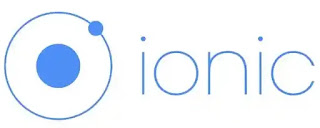Working with native code is a common practice. But it is not always the best choice in the business sense. Creating the same application for multiple platforms can result in a significant loss of time. HTML5 mobile interface frameworks can help you to build multi-platform mobile applications to keep the original appearance.
Using knowledge of ordinary languages such as (HTM5, CSS, JavaScript), developers build cross-platform applications with minimal energy loss. You create the application as a normal web / responsive application, and It will be adapted to different screen sizes. Therefore, you create one mobile app, and you will be able run it on all platforms.
You can also find many UI / UX platforms and frameworks.
What Are the Best Platforms for Creating Mobile Apps
Ionic:
This platform quickly became a secure leader in the development of hybrid mobile applications. Its creators are constantly updating and adapting new technologies. It keeps Ionic up to date. Likewise, this platform is 100% free and open source. The community downloads and shares tons of development resources, making your work with them a lot easier.
Ionic recently took advantage of the angular tools; it uses Cordova to allow users to become native for iOS, Android, Windows, etc. Overall, Ionic is our choice for rapid and resulting mobile application development.
Onsen UI:
Even though he is a relatively new player in the market, Onsen has managed to create a large community of fans. It is open source and available under an Apache license. By using the angular directives and the Topcoat platform for most of its user interface components, this platform creates perfect conditions for the rapid development of mobile applications. It also gives you access to jQuery-based components, so you get the perfect mix of jQuery and Angular technologies. But the main advantages are its flexibility and its great scalability.
Intel XDK:
Another new player on the block with great potential. Intel XDK comes with a wide range of tools that support the development, testing, emulation, debugging, and publishing of cross-platform HTM5 hybrid applications. This open source JavaScript framework powered by Intel has a clean and transparent workflow and a rich set of features, making it a leader in this domain.
Sencha Touch:
This platform is mainly created for mobile application development platforms in commercial areas, mainly businesses. If Ionic is a great choice for freelancers and small teams, Sencha Touch is making its way as a business platform. Its basic infrastructure, ExtJS, works perfectly to create high performance applications with a tactile experience close to native.
Kendo UI:
For businesses, this platform is often preferred over others when it comes to large businesses. The Kendo user interface allows you to create literally any type of web or hybrid mobile application with HTML5, JavaScript and CSS. It is based on jQuery and contains over 70 jQuery gadgets, as well as Angular and Bootstrap user interface integration, which greatly facilitates the development process. And don't forget the ready-made themes and templates.
You can also Read:


















0 commentaires:
Post a Comment